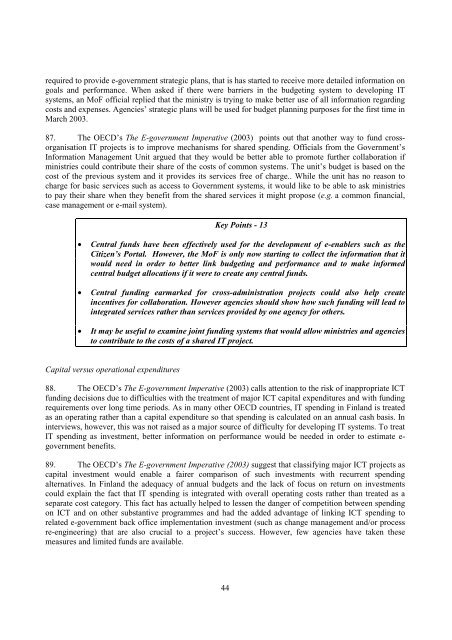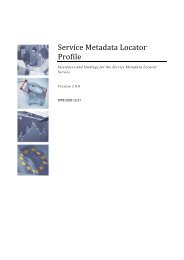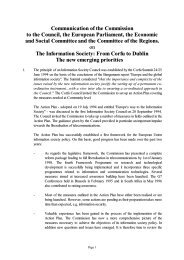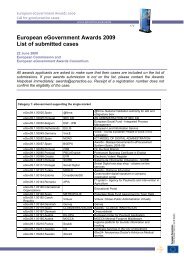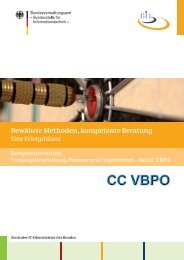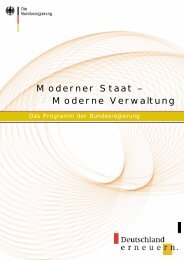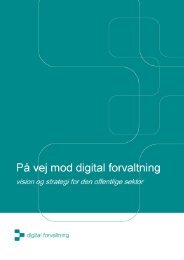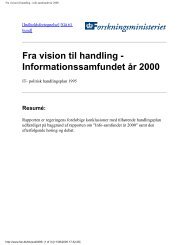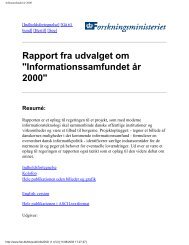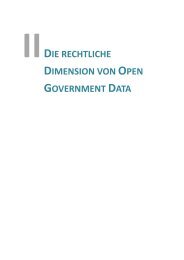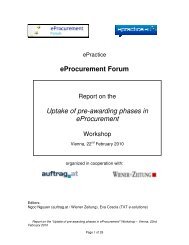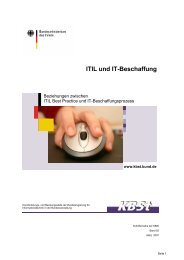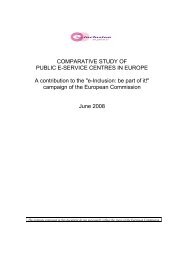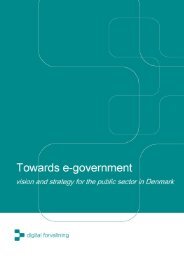e-GOVERNMENT IN FINLAND - ePractice.eu
e-GOVERNMENT IN FINLAND - ePractice.eu
e-GOVERNMENT IN FINLAND - ePractice.eu
You also want an ePaper? Increase the reach of your titles
YUMPU automatically turns print PDFs into web optimized ePapers that Google loves.
equired to provide e-government strategic plans, that is has started to receive more detailed information on<br />
goals and performance. When asked if there were barriers in the budgeting system to developing IT<br />
systems, an MoF official replied that the ministry is trying to make better use of all information regarding<br />
costs and expenses. Agencies’ strategic plans will be used for budget planning purposes for the first time in<br />
March 2003.<br />
87. The OECD’s The E-government Imperative (2003) points out that another way to fund crossorganisation<br />
IT projects is to improve mechanisms for shared spending. Officials from the Government’s<br />
Information Management Unit argued that they would be better able to promote further collaboration if<br />
ministries could contribute their share of the costs of common systems. The unit’s budget is based on the<br />
cost of the previous system and it provides its services free of charge.. While the unit has no reason to<br />
charge for basic services such as access to Government systems, it would like to be able to ask ministries<br />
to pay their share when they benefit from the shared services it might propose (e.g. a common financial,<br />
case management or e-mail system).<br />
Key Points - 13<br />
x Central funds have been effectively used for the development of e-enablers such as the<br />
Citizen’s Portal. However, the MoF is only now starting to collect the information that it<br />
would need in order to better link budgeting and performance and to make informed<br />
central budget allocations if it were to create any central funds.<br />
x Central funding earmarked for cross-administration projects could also help create<br />
incentives for collaboration. However agencies should show how such funding will lead to<br />
integrated services rather than services provided by one agency for others.<br />
x It may be useful to examine joint funding systems that would allow ministries and agencies<br />
to contribute to the costs of a shared IT project.<br />
Capital versus operational expenditures<br />
88. The OECD’s The E-government Imperative (2003) calls attention to the risk of inappropriate ICT<br />
funding decisions due to difficulties with the treatment of major ICT capital expenditures and with funding<br />
requirements over long time periods. As in many other OECD countries, IT spending in Finland is treated<br />
as an operating rather than a capital expenditure so that spending is calculated on an annual cash basis. In<br />
interviews, however, this was not raised as a major source of difficulty for developing IT systems. To treat<br />
IT spending as investment, better information on performance would be needed in order to estimate egovernment<br />
benefits.<br />
89. The OECD’s The E-government Imperative (2003) suggest that classifying major ICT projects as<br />
capital investment would enable a fairer comparison of such investments with recurrent spending<br />
alternatives. In Finland the adequacy of annual budgets and the lack of focus on return on investments<br />
could explain the fact that IT spending is integrated with overall operating costs rather than treated as a<br />
separate cost category. This fact has actually helped to lessen the danger of competition between spending<br />
on ICT and on other substantive programmes and had the added advantage of linking ICT spending to<br />
related e-government back office implementation investment (such as change management and/or process<br />
re-engineering) that are also crucial to a project’s success. However, few agencies have taken these<br />
measures and limited funds are available.<br />
44


